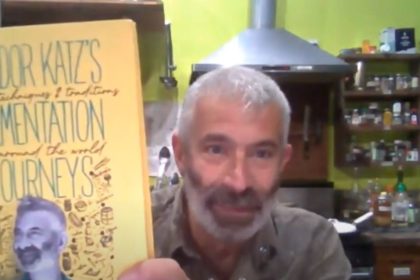
When Sandor Katz was asked to teach his first fermentation workshops in the early ‘90s, he figured it would have only niche appeal. Instead, people filled his workshops, begging for more information and calling on him to host similar events all over the U.S. “People [were] hungry for more information on fermentation,” he says.
“Humans didn’t invent fermentation. Fermentation is a natural phenomenon that existed before we did,” Katz says, speaking from in front of a wall of ferments and spices in his home kitchen in Tennessee. “Fermentation is an essential part of how people everywhere make effective use of whatever food resources are available to them. Food fermentation is not precious; fermentation is practical.”
Katz was a keynote speaker at the FERMENTATION 2021 conference. He shared his personal journey into the subject as well as his thoughts on fermentation as a natural phenomenon.
Fermentation as Trend
Katz says people are excited about fermentation for different reasons — some have memories of fermenting with their grandparents and want to try it at home, others are immigrants wanting to recreate dishes from their native countries, some are farmers hoping to preserve a surplus of produce, others are interested in the health benefits and some are foodies chasing the delicious flavor.
He hates equating fermentation with trends, preferring the term “fermentation revitalization” — the demographics of people currently making fermentation “trendy” again hasn’t really changed in the last 30 years.
“Fermentation has been so important to food traditions everywhere, and yet because of factory food production, one-stop shopping convenience foods, fewer and fewer people were practicing fermentation,” Katz said, recalling his workshops in the early days. “It was becoming more mysterious to people. Now there’s no denying that fermentation is trending. There’s a heightened awareness of fermentation, but people don’t realize the products of fermentation have been so integral to how everybody, everywhere eats. Without even thinking about fermentation, people have always been eating products of fermentation.”
The “War on Bacteria”
But there has long been fear around fermentation from some consumers. Katz says many people “project their anxiety about bacteria onto the idea of fermentation.”
“For people of my generation and older, we never heard anybody say anything positive about bacteria. The degree that bacteria were talked about at all, it was about how dangerous they are and how much they need to be avoided. I grew up in a period that could be described as the war on bacteria, this idea that bacteria are pathogenic, bacteria are dangerous to us, bacteria must be avoided and you know we have an arsenal of chemicals that we can use to kill bacteria as needed to keep us safe.”
The U.S Department of Agriculture has never had a case of foodborne illness from fermented food or beverages, Katz notes. “Statistically speaking, fermented vegetables are safer than raw vegetables.”
Facing people’s questions and fears motivated Katz to write his first book, The Art of Fermentation. This month, he released his 6th title, Fermentation Journeys: Recipes, Techniques, and Traditions from Around the World.
Fermenting the Future
Katz is an advocate for decentralizing food production, replacing a global supply chain with local, farm-fresh sources. Though this will raise the cost of food, it will put fermentation as a key means of preserving a surplus of seasonal crops, Katz notes.
Even as more and more chefs and producers apply different processes to different substrates and play with flavor, Katz says the fundamental processes remain the same. Nothing new has been invented in fermentation, which dates back 10,000 years.
“Fermentation of the future grows out of the techniques and traditions of the past,” he says. “Anything you can possibly eat can be fermented, so I’m never surprised when something is fermented.”
Katz shared his story of fermenting a goat on the rural Tennessee farm he lived on in the ‘90s. After the animal was butchered, he took the leftover pieces and fermented them for a few weeks in a mix of miso, yogurt and sauerkraut juice. When cooked, the meat released a strong aroma, a scent that became legendary on the farm. But, Katz says, “It was delicious. Like many things, it had a stronger aroma than flavor.”
Health Benefits Come with Warning Labels
When asked about the curative health benefits of fermented foods, Katz does not mince words. He wrote in Wild Fermentation that fermented foods were an important part of his healing when he was diagnosed with HIV in 1991. Since then, numerous media outlets have twisted his story, writing that Katz cured himself from HIV with fermented foods.
“I have become much more cautious about how I talk about this,” he says. “There’s a lot of highly speculative information out there…and I’ve never seen data that would suggest that.”
Katz says he’s careful to rely on reputable scientific studies for data on fermentation’s health benefits. He says he’s read articles claiming kombucha will prevent hair from going gray. Pointing to his full head of gray hair, Katz smiles and says “When I started teaching about fermentation, my hair didn’t look like this. Time marches on.”
“Food has profound implications for our health and well-being and for how we feel, but singular foods are very rarely the cure to specific diseases. …There are many benefits to fermentation, whether it is simply from pre-digestion of nutrients that makes nutrients more bioavailable and accessible to us or whether it’s from the probiotics or whether it’s from metabolic byproducts which can be extraordinarily beneficial to us.”
